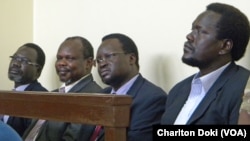JUBA —
The trial of four South Sudanese politicians accused of treason for their role in an alleged coup attempt against President Salva Kiir in December resumed Thursday in Juba.
The hearing was adjourned last week when prosecutors told the court they wanted seven other politicians, who were released to the custody of Kenyan authorities in January, to return to South Sudan and face trial.
The seven former detainees have not returned to Juba and were not in court on Thursday. James Mayen, the lead prosecutor, asked the five judges to adjourn the hearing again until they return to South Sudan.
But presiding judge James Alala ruled that the trial should go ahead. He said another delay would deny the four men who are in court their right to justice.
Lead defense lawyer Monytuil Alor said he was pleased with the judge's decision.
"It went our way, in the sense that the prosecution wanted to delay the trial on the grounds that the seven were not brought, and they wanted to wait for the seven. We objected to that vigorously and we asked the court to continue the trial of the four, which the court approved,” he said.
Mayen declined to speak to reporters at the hearing.
On Thursday the prosecution called two witnesses, including the commander of the presidential guard, Marial Chanuon.
He testified that the four politicians in the dock -- former Security Minister Oyay Deng Ajak, former SPLM Secretary General Pagan Amum, former Deputy Defense Minister Majok D'Agot Atem, and the former top envoy of the Southern Sudan government in Washington, Ezekiel Lol Gatkuoth -- were part of a group suspected of instigating the fighting that erupted in Juba on December 15.
Chanuon said that on the day the fighting began, soldiers ignored his orders and broke into the armory at the headquarters of South Sudan's ground forces to take weapons.
Chanuon also testified that 76 senior officers and 730 soldiers failed to turn up for morning parade the day after the violence started. They are believed to have rebelled, he said.
Attorney Alor said the defense will cross-examine the prosecution witnesses on Friday before they present their own case.
The hearing was adjourned last week when prosecutors told the court they wanted seven other politicians, who were released to the custody of Kenyan authorities in January, to return to South Sudan and face trial.
The seven former detainees have not returned to Juba and were not in court on Thursday. James Mayen, the lead prosecutor, asked the five judges to adjourn the hearing again until they return to South Sudan.
But presiding judge James Alala ruled that the trial should go ahead. He said another delay would deny the four men who are in court their right to justice.
Lead defense lawyer Monytuil Alor said he was pleased with the judge's decision.
"It went our way, in the sense that the prosecution wanted to delay the trial on the grounds that the seven were not brought, and they wanted to wait for the seven. We objected to that vigorously and we asked the court to continue the trial of the four, which the court approved,” he said.
Mayen declined to speak to reporters at the hearing.
On Thursday the prosecution called two witnesses, including the commander of the presidential guard, Marial Chanuon.
He testified that the four politicians in the dock -- former Security Minister Oyay Deng Ajak, former SPLM Secretary General Pagan Amum, former Deputy Defense Minister Majok D'Agot Atem, and the former top envoy of the Southern Sudan government in Washington, Ezekiel Lol Gatkuoth -- were part of a group suspected of instigating the fighting that erupted in Juba on December 15.
Chanuon said that on the day the fighting began, soldiers ignored his orders and broke into the armory at the headquarters of South Sudan's ground forces to take weapons.
Chanuon also testified that 76 senior officers and 730 soldiers failed to turn up for morning parade the day after the violence started. They are believed to have rebelled, he said.
Attorney Alor said the defense will cross-examine the prosecution witnesses on Friday before they present their own case.




